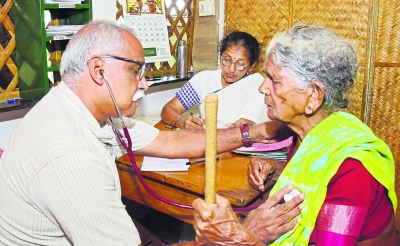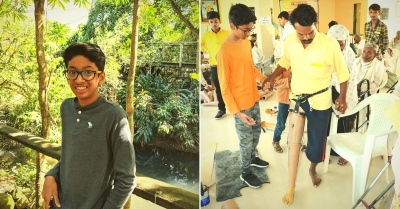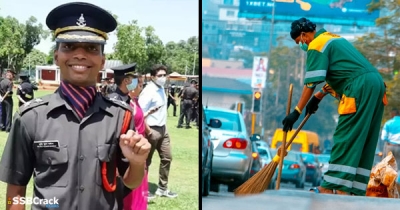Individuals who inspire change

Water crisis, stigma around menstruation, gender bias, looming climate disaster... the world they inhabit throws several challenges their way. But with a mind full of ideas and focus, and a heart full of compassion, courage, and commitment, teenagers set out to better our world. In the process, they shatter the myth that one's gender and age are crucial for creating a positive social impact. Here are eight stories of change from across our country...
Licypriya Kangujam, Manipur
Focus area: Environment and climate change
Hailed as one of the youngest climate activists in the world, Licypriya Kangujam has been fighting for a greener planet since she was six. An 11-year-old today, she has been seeking "new laws to curb India's high pollution levels and wants climate change lessons to be mandatory in schools".
Licypriya says her activism was kindled when she attended a UN disaster conference in Mongolia with her father. She has showcased a (symbolic) device called SUKIFU (Survival Kit for the future), with details of SUKIFU-2 (to “make water from air. It runs purely on solar power”) shared on social media just a few months ago. While she steadfastly refuses to engage with the sobriquet "Greta (Thunberg) of India", she certainly seems to share the Swedish climate activist's iconic spunk-in 2020, when the Indian government mentioned her on Twitter for International Women's Day with the hashtag #sheinspiresUs, she expressed her thanks for the honour but not before saying "Please don't celebrate me if you are not going to listen to my voice". The pre-teen courted controversy when a few netizens pointed out that her claims about some of her awards and speeches were false. She termed these allegation baseless, and continues to focus on what is clearly close to her heart- climate activism.
Sagarika Deka, Assam
Focus areas: Gender equality, menstrual hygiene, body positivity, mental health, environment
A feminist and slam poet, teenager Sagarika Deka was deeply Atroubled learning about the trauma women suffered during the Rohingya crisis that unfolded in Myanmar a few years ago. She channelled her concerns through her poems, social media posts, and open mic performances. The encouraging response she received nudged her to find a larger way to create a world that's equal-in 2020, as an 18-year-old, she set up Maan Ki Umeed, a non-profit. Focussing on children's issues and women's empowerment, its focal areas have been "empowerment, employment, education, and service. Among the projects that are part of the non-profit are those to enrol less privileged children in primary schools and also integrate discussions around menstrual hygiene as part of school curriculum. Through her non-profit, Sagarika uses the power of conversations on "gender equality, menstrual hygiene, body positivity, mental health, environment" etc. in her quest to create a better world. Over the last two years, the number of members of her non-profit grown, and so has its initiatives-helping less privileged women find jobs, set up small businesses, or teach them handicraft, calling for the need to provide sanitary pads to women during natural disasters, etc.
Swara Patel, Maharashtra
Focus areas: Menstrual education and hygiene
On May 28, 2019, 16-year-old Swara Patel set up the The Period Society - it was just the right day for the non-profit to take off because it was World Menstrual Health Day. Since her first period, Swara has had access to products for menstrual hygiene. Sadly though, along with access came taboos too- from her own family of healthcare professionals such as being disallowed to visit temples while menstruating. Gradually, Swara discovered that many women faced not just taboos but also lacked access to menstrual education and hygiene products such as sanitary pads. The Period Society was the result of her concerns on period poverty. What started off in Mumbai has chapters today across the globe, including in the U.K. and the U.S. The Society has hundreds of members (and growing!) conducting menstrual health education sessions (including virtual ones), and eco-friendly sanitary pad distribution camps. Through her organisation Swara hopes to create a platform for stigma-shattering conversations around not just menstruation but also sexual and reproductive health and gender inclusivity.
Anushka Prakash, Uttarakhand
Focus areas: Rural empowerment through education
Even as the pandemic raged on, 16-year-old Anushka Prakash Even continued her education, thanks to online classes. But she realised not everyone was as fortunate. It disturbed her that several students out there in rural areas had to discontinue their education as schools had shut. She decided that won't do, and Project Prakash came about. This online platform offers free access to resources (in both English and Hindi) on various subjects, in addition to online lectures and classes from many international universities. It also provides videos on career options so students can understand the choices available to them before making a decision based on their interests and passion. Aware of the strong impact that education and technology can together create, Anushka feels those who are privileged can help empower others by using the two judiciously.
Ananya Kamboj. Punjab
Focus areas: Leadership, empowerment, friendship, and self-awareness through sports
A football player at school and at a local club, Ananya Kamboj A sees it as more than just a sport-a tool to form and strengthen friendships. And so it seems fitting that as a 13-year-old in 2017, when she wrote an essay on how football fosters friendship, she was selected to represent India as a young journalist at the Football for Friendship programme in Russia. That opportunity reinforced her faith in what sports can do, and resulted in a book detailing her experiences. Not just that. It also led her to set up Sports to Lead, a recent initiative offering several programmes that use the power of sports to empower young people. One of them is the 'Be You' programme. "designed for young women, empowering them to move forward in life by developing self-awareness, healthy relationships and communication and leadership skills".
Ridhima Pandey, Uttarakhand
Focus areas: Government and citizen action for a better world
As a five-year-old in 2013, Ridhima Pandey witnessed Ajinthand her state of first-hand in her State what the fury of floods could leave in its wake-claim hundreds of lives and leave countless homeless. In 2017, an upset Ridhima, aged nine, filed a complaint against the government with the National Green Tribunal. Also one of the young activists to file a lawsuit in the United Nations Conventions on the Rights of the Child, she feels strongly about the need "to save the future of all the children and all people of future generations". Despite India being vulnerable to the negative impacts of climate change, she asserts the government is not doing enough to tackle it. Distressed by inaction on several fronts - from the extensive use of fossil fuels to improper garbage disposal methods and the rampant use of plastics, she suggests that while the government must take proactive steps we as citizens should be mindful as consumers too.
Hina Saifi, Uttar Pradesh
Focus areas: Awareness on pollution and solar energy
Only a few years ago, Hina Saifi was still a teenager when she discovered that the high pollution levels in her village in Meerut were inversely proportional to people's environmental awareness levels. A strong believer in the power of education, she understood that when people adopt a climate friendly lifestyle, our planet's health will improve dramatically. What followed was door-to-door campaigns, surveys, pamphlet distribution, and events such as 'March for Clean Air. She also launched her Suraj Se Samriddhi' campaign to raise awareness on the benefits of solar power through solar pumps, rooftop solar installations, etc. She is now part of an NGO that works with marginalised communities to focus on areas such as education, gender, and labour rights. Her steadfast pursuit for change through awareness campaigns has been noticed internationally - in 2021, she was one of the 17 climate change leaders who were the face of United Nations India's new campaign #WeTheChangeNow.
Garvita Gulhati, Karnataka
Focus areas: Water management and conservation
As a 15-year-old, Garvita Gulhati was troubled by India's water crisis in 2015. It upset her further that every year we waste 14 million litres simply by leaving behind water in our glasses at restaurants. So upset that she decided to do something about it, and Why Waste? was born. One of this initiative's projects was #GlassHalffull. The pilot project worked with several restaurants to help avoid water being wasted in glasses at restaurants. Since it began, the project is said to have prevented the waste of at least six million litres of water. Today, Why Waste? is also an app that allows each individual to calculate their "water footprint and help them save 100 litres each day with just a bit of planning and thought. A strong believer in little drops making the mighty ocean, Garvita says such small acts locally will have a great impact globally. Aware of the role children have in any social change, she feels water management must be taught at schools. Recipient of the prestigious Diana Award, this India's Water Girl' was in Forbes' list of 30 Under 30.
Picture Credit : Google



